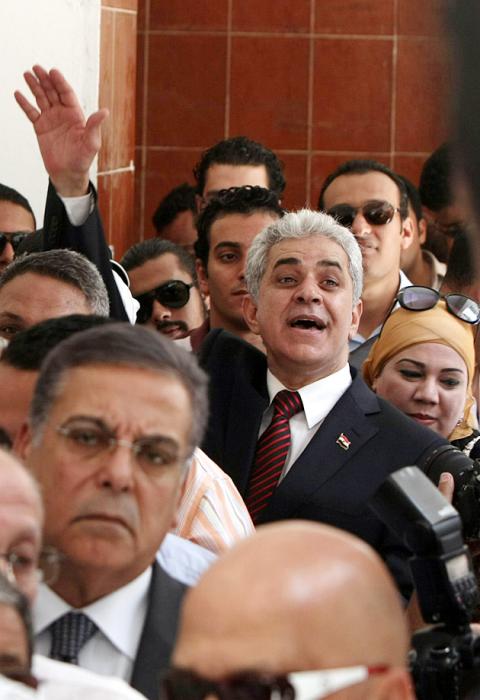Egyptians voted yesterday in the country’s first free presidential elections, with Islamists and secularists vying for power with competing visions of an Egypt liberated of ousted former Egyptian president Hosni Mubarak’s iron grip.
Long lines of people, many in festive mood, wound their way outside polling stations across the country throughout the day after polls opened at 8am.
“It’s a beautiful day for Egypt,” said Nehmedo Abdel Hadi, who was voting at the Omar Makram school in Cairo’s Shubra neighborhood.

Photo: AFP
“Now I feel this is my country and I have dignity,” said the 46-year-old woman, who wears a full-face veil.
Across the city, in the leafy Mohandesseen neighborhood, Rania, wearing gym clothes and a ponytail under her baseball cap, was at the front of the line.
“It’s the first time in Egypt’s history we choose our president,” she said, preferring to keep her choice “a secret between me and my ballot box.”
More than 50 million eligible voters have been called to choose one of 12 candidates wrestling to succeed Mubarak.
Voting over two days is taking place at 13,000 polling stations, with initial results expected on Sunday. Voting ends at 8pm on both days.
A senior interior ministry official said police were on standby across the country and helping soldiers secure polling stations.
The election marks the final phase of a tumultuous transition overseen by the ruling military council after Mubarak’s ouster in a popular uprising last year.
Pollsters say the large number of voters undecided between candidates reflecting radically different trends, and the novelty of a free presidential vote, make the election almost impossible to call.
Turnout in the scorching heat appeared lower than in parliamentary and senate elections last winter, but many voters were expected to cast their ballots later in the day and today.
Leading contenders include former foreign minister and Arab League chief Amr Mussa, who is seen as an experienced politician and diplomat, but like Ahmed Shafiq, Mubarak’s last prime minister, is accused of belonging to the old regime.
The powerful Muslim Brotherhood’s candidate, Mohammed Mursi, faces competition from Abdel Moneim Abul Fotouh, a former member of the Islamist movement who portrays himself as a consensus choice with a wide range of support.
The election caps a roller-coaster transition, marked by political upheaval and bloodshed, but which also witnessed parliamentary polls that saw Islamist groups score a crushing victory.

SECURITY: As China is ‘reshaping’ Hong Kong’s population, Taiwan must raise the eligibility threshold for applications from Hong Kongers, Chiu Chui-cheng said When Hong Kong and Macau citizens apply for residency in Taiwan, it would be under a new category that includes a “national security observation period,” Mainland Affairs Council (MAC) Minister Chiu Chui-cheng (邱垂正) said yesterday. President William Lai (賴清德) on March 13 announced 17 strategies to counter China’s aggression toward Taiwan, including incorporating national security considerations into the review process for residency applications from Hong Kong and Macau citizens. The situation in Hong Kong is constantly changing, Chiu said to media yesterday on the sidelines of the Taipei Technology Run hosted by the Taipei Neihu Technology Park Development Association. With

CARROT AND STICK: While unrelenting in its military threats, China attracted nearly 40,000 Taiwanese to over 400 business events last year Nearly 40,000 Taiwanese last year joined industry events in China, such as conferences and trade fairs, supported by the Chinese government, a study showed yesterday, as Beijing ramps up a charm offensive toward Taipei alongside military pressure. China has long taken a carrot-and-stick approach to Taiwan, threatening it with the prospect of military action while reaching out to those it believes are amenable to Beijing’s point of view. Taiwanese security officials are wary of what they see as Beijing’s influence campaigns to sway public opinion after Taipei and Beijing gradually resumed travel links halted by the COVID-19 pandemic, but the scale of

A US Marine Corps regiment equipped with Naval Strike Missiles (NSM) is set to participate in the upcoming Balikatan 25 exercise in the Luzon Strait, marking the system’s first-ever deployment in the Philippines. US and Philippine officials have separately confirmed that the Navy Marine Expeditionary Ship Interdiction System (NMESIS) — the mobile launch platform for the Naval Strike Missile — would take part in the joint exercise. The missiles are being deployed to “a strategic first island chain chokepoint” in the waters between Taiwan proper and the Philippines, US-based Naval News reported. “The Luzon Strait and Bashi Channel represent a critical access

Pope Francis is be laid to rest on Saturday after lying in state for three days in St Peter’s Basilica, where the faithful are expected to flock to pay their respects to history’s first Latin American pontiff. The cardinals met yesterday in the Vatican’s synod hall to chart the next steps before a conclave begins to choose Francis’ successor, as condolences poured in from around the world. According to current norms, the conclave must begin between May 5 and 10. The cardinals set the funeral for Saturday at 10am in St Peter’s Square, to be celebrated by the dean of the College